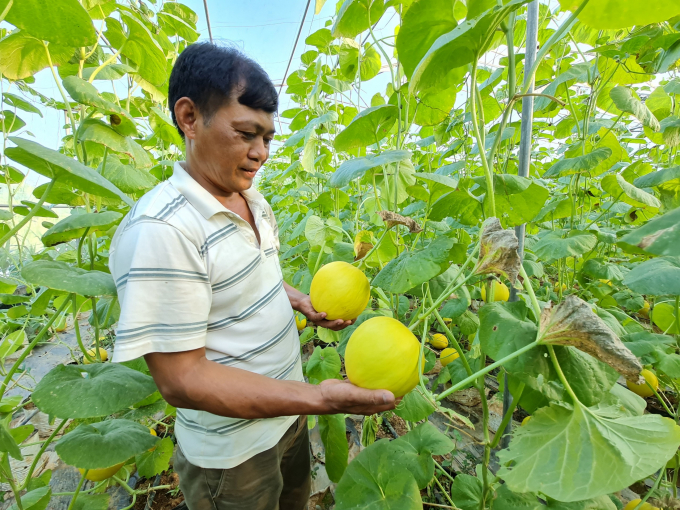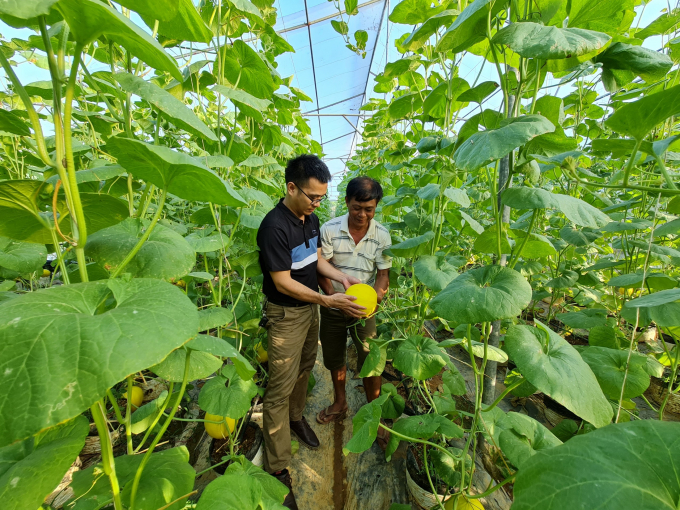June 9, 2025 | 03:53 GMT +7
June 9, 2025 | 03:53 GMT +7
Hotline: 0913.378.918
June 9, 2025 | 03:53 GMT +7
Hotline: 0913.378.918

The model of high-tech cantaloupe cultivation by Doan Cong Oanh, Dao Duc commune, Vi Xuyen district, Ha Giang province earns more than VND700 million per year.
All maintenance methods in Oanh's cantaloupe orchard are meticulous. From the stage of soil preparation and treatment, potting, to the plating cabin area, he carefully crafted the irrigation system. According to Oanh, he began applying the model in 2016 on a more than 4,000m2 plot. To acquire expertise and methods, he traveled to Da Lat, Lam Dong province, to study from gardeners, then researched online to learn from the group's experiences and shares, and finally gained practical experience himself via the planting and care process.
As with other types of fruit growth, cantaloupe cultivated in a cabin will face a variety of illnesses, most of which are fungus. To overcome, the most critical factor is prevention; first and foremost, the soil must be cleaned and handled properly. Once the tree sprouts, it must be treated with biological fungicides on a regular basis until the trees produce fruit.
Oanh said that in addition to prevention, care should be cycle-appropriate, with an emphasis on controlling the growth peak, to ensure the cantaloupe plants remain healthy and pest-free. When the trunk is exposed to high humidity, it should not be left with excessive water; without enough ventilation, the fruiters are vulnerable to fungal infections. Powdery mildew is the most destructive insect that cantaloupe trees face. When it develops, this beetle expands rapidly, consuming all the nutrients in the plant and causing it to become stunted and die.
He suggested that gardeners cultivate cantaloupes in pots to make them more susceptible to nutrition and moisture sources. Because when fruiters are planted in the ground and it rains heavily, they are prone to being waterlogged and dying.
After harvest, he purchases ten tons of manure for each crop, reprocesses it to verify its safety, and then adds it to the garden. He selects biological insecticides and fungicides that are safe for farmers and consumers.

Replicating the model of growing cantaloupe and cantaloupe Oanh enthusiastically guided households to visit and study.
Oanh carefully documented each step in a notebook to ensure a disease-free, healthy, and delicious cantaloupe orchard. Then he went to the Academy of Agriculture and "knocked" on each professor's and doctor's door to inquire about how to cure pests and illnesses, as well as the proper care procedure for plants in order to obtain maximum production and quality. A nutritional meter and a water purity meter work in conjunction with one another to aid in the care process.
Oanh's four membrane houses producing cantaloupe according to Israeli technology offer a consistent yield and quality due to years of expertise growing and caring for fruit trees. Between 14 and 16 percent Brix is considered average sweetness. Each fruit weighs between 1.2 and 1.5 kg on average; however, there are fruit trees that weigh up to 2.7 kg. Three OCOP stars have been awarded to his melon products. All items have traceability marks, and merchants come to the garden to purchase them for between VND35,000 and 40,000 per kilogram. Oanh makes more than VND700 million each year as a result of the model.
Oanh actively led families to visit and learn, replicating the concept of cantaloupe cultivation. However, upon seeing his stringent care methods, several families shook their heads in fear of falling behind. Numerous families are likewise motivated to learn but fail to follow his directions until the melons get ill, the whole garden perishes, and the melons become unmarketable. However, there are many models that he assisted in successfully maintaining. Typically, Nguyen Viet Lam's model of producing cantaloupe in a cabin home in Khang Nhat commune, Son Duong district, yields about VND 200 million per year.
Translated by Linh Linh
/2025/06/05/5314-1-184727_407.jpg)
(VAN) From seemingly worthless fish scales and skin, enzymes and lactic ferments can transform by-products into peptides, opening a sustainable, effective business direction and elevating Vietnamese seafood.

(VAN) TTC AgriS and IFC signed a strategic partnership to develop a sustainable agricultural value chain, aiming to achieve the Net Zero target by 2035.

(VAN) Seafood by-products are opening a new path, combining green growth and technological innovation to enhance the industry's value.

(VAN) Mr. Nguyen Thanh Cong, Vice Chairman of the Son La Provincial People's Committee, reflects on Son La’s journey from barren hills to fruitful orchards after a decade of hard work.

(VAN) FAO’s Director-General addresses the 5th Baghdad International Water Conference.
/2025/05/26/1716-4-nongnghiep-191706.jpg)
(VAN) Chain linkages, technological innovation, and raw material zoning are three strategic pillars for the coconut industry to strongly develop and elevate its position on the global agricultural map.
![Advanced mariculture – an inevitable trend: [4] Accompanied by scientists](https://t.ex-cdn.com/nongnghiepmoitruong.vn/608w/files/sohk/2025/05/13/1941-pgsts-vo-van-nha-140958_717.jpg)
(VAN) According to Assoc. Prof. Dr. Vo Van Nha, Director of the RIA III, the development of advanced offshore mariculture is no longer an option but an essential path for Vietnam’s fisheries sector.